Make ZIM file from Gutenberg books
Project description
Gutenberg Offline
This scraper downloads the whole Project Gutenberg library and puts it in a ZIM file, a clean and user friendly format for storing content for offline usage.
[!WARNING] This scraper is now known to have a serious flaw. A critical bug https://github.com/openzim/gutenberg/issues/219 has been discovered which leads to incomplete archives. Work on https://github.com/openzim/gutenberg/issues/97 (complete rewrite of the scraper logic) now seems mandatory to fix these annoying problems. We however currently miss the necessary bandwidth to address these changes. Help is of course welcomed, but be warned this is going to be a significant project (at least 10 man.days to change the scraper logic so that we can fix the issue I would say, so probably the double since human is always bad at estimations).
Getting Started
The recommended way to run the Gutenberg scraper is using Docker, as it comes with all required dependencies pre-installed.
Running with Docker
- Run the scraper with Docker:
docker run -it --rm -v $(pwd)/output:/output ghcr.io/openzim/gutenberg:latest gutenberg2zim
The -v $(pwd)/output:/output option mounts the output folder in your current directory to the /output folder inside the container (which is the working directory). This ensures that the ZIM file is saved to your local machine.
- Show available options:
To view all the available options for gutenberg2zim, run:
docker run ghcr.io/openzim/gutenberg:latest gutenberg2zim --help
Arguments
Customize the content download with the following options. For example, to download books in English or French with IDs 100 to 200 and only in PDF format:
docker run -it --rm -v $(pwd)/output:/output ghcr.io/openzim/gutenberg:latest gutenberg2zim -l en,fr -f pdf --books 100-200 --lcc-shelves all --title-search
This will download books in English and French that have the Id 100 to 200 in the HTML (default) and PDF format. The -it flags allow you to see progress. The --rm flag removes the container after completion.
You can find the full arguments list below:
-h --help Display this help message
-F --force Overwrite existing ZIM file
-l --languages=<list> Comma-separated list of lang codes to filter export to (preferably ISO 639-1, else ISO 639-3)
-f --formats=<list> Comma-separated list of formats to filter export to (epub, html, pdf, all)
-z --zim-file=<file> Write ZIM into at this file path
--zim-name=<name> Set ZIM name (metadata)
-t --zim-title=<title> Set ZIM title
-n --zim-desc=<description> Set ZIM description
-L --zim-long-desc=<description> Set ZIM long description
--zim-languages=<languages> Set ZIM Language metadata
-b --books=<ids> Execute the processes for specific books, separated by commas, or dashes for intervals
-c --concurrency=<nb> Number of concurrent process for processing tasks
--no-index Do NOT create full-text index within ZIM file
--title-search Add field to search a book by title and directly jump to it
--lcc-shelves=<shelves> Comma-separated list of LCC shelf codes to include
(e.g., P,PR,Q). Use 'all' to generate all shelves. If omitted, no shelf generated.
--stats-filename=<filename> Path to store the progress JSON file to
--publisher=<zim_publisher> Custom Publisher in ZIM Metadata (openZIM otherwise)
--mirror-url=<mirror_url> Optional custom url of mirror hosting Gutenberg files
--output=<output_folder> Output folder for ZIMs. Default: /output
--debug Enable verbose output
The scraper will automatically perform all steps: download catalog and RDF files, parse metadata, download books, and create the ZIM file.
Contributing Code
Main coding guidelines are from the openZIM Wiki.
Setting Up the Environment
Here we will setup everything needed to run the source version from your machine, supposing you want to modify it. If you simply want to run the tool, you should either install the PyPi package or use the Docker image. Docker image can also be used for development but needs a bit of tweaking for live reload of your code modifications.
Install the dependencies
First, ensure you use the proper Python version, inline with the requirement of pyproject.toml (you might for instance use pyenv to manage multiple Python versions in parallel).
You then need to install the various tools/libraries needed by the scraper.
The setup is divided into two categories: one for simply running the scraper and another for setting up a development environment for contributing and making improvements
For Users Running the Scraper:
GNU/Linux
sudo apt update && sudo apt install -y python3-pip zim-tools
Fedora
sudo dnf install -y python3-pip zim-tools
Arch linux
sudo pacman -S python-pip zim-tools
macOS
brew install zim-tools
For Developers Contributing & Modifying;
GNU/Linux
sudo apt update && sudo apt install -y python3-pip zim-tools
Fedora
sudo dnf install -y python3-pip zim-tools
Arch linux
sudo pacman -S python-pip zim-tools
macOS
brew install zim-tools
Setup the package
First, clone this repository.
git clone git@github.com:openzim/gutenberg.git
cd gutenberg
If you do not already have it on your system, install hatch to build the software and manage virtual environments (you might be interested by our detailed Developer Setup as well).
pip3 install hatch
Start a hatch shell: this will install software including dependencies in an isolated virtual environment.
hatch shell
That's it. You can now run gutenberg2zim from your terminal.
Screenshots

License
Project details
Release history Release notifications | RSS feed
Download files
Download the file for your platform. If you're not sure which to choose, learn more about installing packages.
Source Distribution
Built Distribution
Filter files by name, interpreter, ABI, and platform.
If you're not sure about the file name format, learn more about wheel file names.
Copy a direct link to the current filters
File details
Details for the file gutenberg2zim-3.0.1.tar.gz.
File metadata
- Download URL: gutenberg2zim-3.0.1.tar.gz
- Upload date:
- Size: 2.0 MB
- Tags: Source
- Uploaded using Trusted Publishing? Yes
- Uploaded via: twine/6.1.0 CPython/3.12.8
File hashes
| Algorithm | Hash digest | |
|---|---|---|
| SHA256 |
a1bebc47afc7fc805b005e948378add1178d3c97b76ce81e1b105c4c657b4954
|
|
| MD5 |
d563fce8e0f6deeaa93f2bce9c8664bb
|
|
| BLAKE2b-256 |
261fbbceef92ba1086a1104ceb6651c3c020afe66d2b3878091695443d5dec2e
|
Provenance
The following attestation bundles were made for gutenberg2zim-3.0.1.tar.gz:
Publisher:
Publish.yaml on openzim/gutenberg
-
Statement:
-
Statement type:
https://in-toto.io/Statement/v1 -
Predicate type:
https://docs.pypi.org/attestations/publish/v1 -
Subject name:
gutenberg2zim-3.0.1.tar.gz -
Subject digest:
a1bebc47afc7fc805b005e948378add1178d3c97b76ce81e1b105c4c657b4954 - Sigstore transparency entry: 721309071
- Sigstore integration time:
-
Permalink:
openzim/gutenberg@b1168665317d8a75f84e1d8f40131df80f15ecad -
Branch / Tag:
refs/tags/v3.0.1 - Owner: https://github.com/openzim
-
Access:
public
-
Token Issuer:
https://token.actions.githubusercontent.com -
Runner Environment:
github-hosted -
Publication workflow:
Publish.yaml@b1168665317d8a75f84e1d8f40131df80f15ecad -
Trigger Event:
release
-
Statement type:
File details
Details for the file gutenberg2zim-3.0.1-py3-none-any.whl.
File metadata
- Download URL: gutenberg2zim-3.0.1-py3-none-any.whl
- Upload date:
- Size: 1.8 MB
- Tags: Python 3
- Uploaded using Trusted Publishing? Yes
- Uploaded via: twine/6.1.0 CPython/3.12.8
File hashes
| Algorithm | Hash digest | |
|---|---|---|
| SHA256 |
4bd733501cd56a0ca5ddfdc41c71819e938f556852060b90a30fcae122e16d05
|
|
| MD5 |
aa9fd7552cfd96f33f2c51df817a3e50
|
|
| BLAKE2b-256 |
82509771ba948f3ffa90c05486a77ad1ee128b5cf37eae5f2a400f78195f3213
|
Provenance
The following attestation bundles were made for gutenberg2zim-3.0.1-py3-none-any.whl:
Publisher:
Publish.yaml on openzim/gutenberg
-
Statement:
-
Statement type:
https://in-toto.io/Statement/v1 -
Predicate type:
https://docs.pypi.org/attestations/publish/v1 -
Subject name:
gutenberg2zim-3.0.1-py3-none-any.whl -
Subject digest:
4bd733501cd56a0ca5ddfdc41c71819e938f556852060b90a30fcae122e16d05 - Sigstore transparency entry: 721309086
- Sigstore integration time:
-
Permalink:
openzim/gutenberg@b1168665317d8a75f84e1d8f40131df80f15ecad -
Branch / Tag:
refs/tags/v3.0.1 - Owner: https://github.com/openzim
-
Access:
public
-
Token Issuer:
https://token.actions.githubusercontent.com -
Runner Environment:
github-hosted -
Publication workflow:
Publish.yaml@b1168665317d8a75f84e1d8f40131df80f15ecad -
Trigger Event:
release
-
Statement type:


















